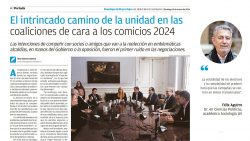CIESAL researcher Felix Aguirre was interviewed by El Mercurio de Valparaíso
20/03/2024
Félix Aguirre, professor at the UV School of Sociology and researcher recently integrated into CIESAL, was interviewed by El Mercurio de Valparaíso on “the intricate path of unity in political coalitions in the face of the 2024 municipal elections”.
Aguirre referred in the article to the chances of success of both the ruling party and the opposition in the upcoming municipal elections. With regard to the corruption cases that have affected several mayors and for which they have been prosecuted recently, Aguirre believes that they will have a great impact: “It will surely be the main issue of the campaigns, with an enormous capacity to pierce both Tyrians and Trojans”.
Regarding the possibility of predicting the behaviour of voters who previously did not vote and will now have to do so, Aguirre told the Sunday section of Reportajes del Mercurio: “The mystery will remain, effectively, above all in first-time voters and in the 18 to 30 age brackets. The volatility shown by voters recently and the complexity of predicting with polls will mean that the campaigns will focus on very cross-cutting issues, away from the issues that have kept the attention during the two constituent campaigns and will focus on issues such as security, corruption, unemployment and the need for public investment, and on ‘hard’ values that will insist on the strengthening of authority, a propitious ground for a conservative vision of politics to impose itself and a preamble to what may happen in the next presidential and legislative elections”.
Félix Aguirre, professor at the UV School of Sociology and researcher recently integrated into CIESAL, was interviewed by El Mercurio de Valparaíso on “the intricate path of unity in political coalitions in the face of the 2024 municipal elections”.
In the article, along with Félix Aguirre, Raúl Burgos, director of the Observatory of History and Politics PUCV; María José Arredondo, analyst at Encuesta Signos; and Pepe Auth, analyst and electoral expert, were consulted.
Félix Aguirre, from the Faculty of Social Sciences – who developed a major international project on COVID-19 between 2020 and 2022 – was recently invited to join CIESAL as a researcher with the aim of making a contribution from his area and supporting research that requires the inclusion of social sciences, qualitative methodologies and research ethics.
With the incorporation of Professor Aguirre, CIESAL is consolidating as a centre that gives importance to the interdisciplinary and transdisciplinary view of different topics, contributing to the ultimate goal of the Centre’s work, which is to generate better health for society.



